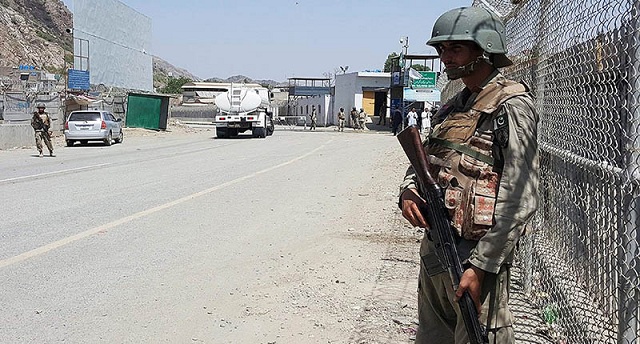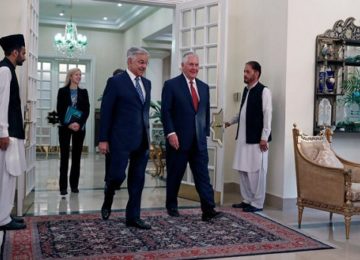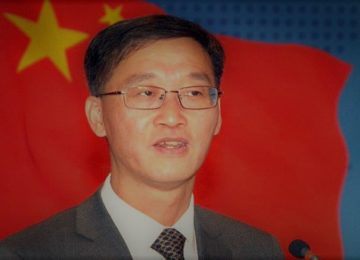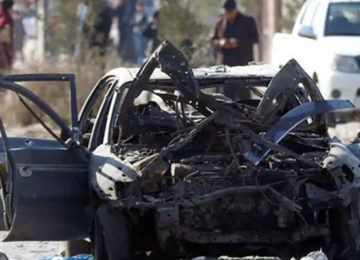Operations chiefs of Pakistani and Afghan militaries held talks in Pakistan on Sunday to review progress on security cooperation, appointment of liaison officers and establishment of coordination centres along the border, sources privy to the meeting said.
Director generals military operations of the two countries met amid growing interaction between the military officials in recent months to finalise deployment of liaison officers (LOs), establishment of Ground Coordination Centres (GCCs) for intelligence sharing and to monitor cross-border movement of militants, people familiar with the discussions told Daily Times.
LOs would share intelligence about suspects to the host country and would accompany intelligence officials during raids against suspects.
GCCs will be established at Torkham and Chaman, the main crossing points in the first phase, and more will be put in place at a later stage along other border points.
Pakistan and Afghanistan are in the process to finalise joint working groups on ‘Military to Military Coordination and Intelligence Cooperation’ under the Afghanistan-Pakistan Action Plan for Peace and Security (APAPPS) that provides a framework to deepen interaction in all spheres of bilateral engagements.
Members for the groups are likely to be finalised this month.
The development came ahead of the visit of Chief of Army Staff (COAS) General Qamar Javed Bajwa this week at the invitation of Afghan President Ashraf Ghani. This will be General Bajwa’s second meeting with the Afghan president in nine months. The army chief last visited Kabul in October that was seen as a breakthrough in revival of high-level exchanges.
Afghan DGMO Najibullah Alizai led his side in talks with his Pakistani counterparts, sources said.
Reconciliation in Afghanistan is now one of the key aspects of the Pak-Afghan security officials as was agreed during the talks between General Qamar Javed Bajwa and a high level Afghan delegation led by National Security Adviser Haneef Atmar in Rawalpindi last month.
Although Pakistan insists reconciliation is an Afghan affair and a shared responsibility, Kabul and US officials believe Pakistan is a key to encourage the Taliban to join the intra-Afghan dialogue.
Lisa Curtis, a senior adviser to the US president, and US Secretary of State Mike Pompeo, who spoke by phone with Army Chief Gen Qamar Javed Bajwa on Thursday, discussed the process of political reconciliation in Afghanistan, according to media reports.
“We have asked for Pakistan’s assistance in facilitating a peace process,” Lisa Curtis was quoted as saying at a seminar in Washington last week.
Pakistani officials now admit the country’s leverage on the Taliban is limited, urging other stakeholders to use their contacts with the Taliban.
Pakistani and Afghan officials confided to Daily Times the two countries had bridged the trust gap and agreed on bilateral dialogue mechanism as both had “shown flexibility” on certain issues during the talks for adopting the APASSP.
“The situation was changed with the visit to Kabul by former Pakistani prime minister Shahid Khaqan Abbasi in first week of April. President Ashraf Ghani and Afghan officials showed flexibility and agreed on the APAPPS,” a Pakistani official said.
Afghan Deputy Foreign Minister Hekmat Karzai visited Pakistan shortly after the Abbasi’s visit and both sides adopted the APAPPS document and agreed on seven principles.
“The visit was aimed at maintaining/strengthening the positivity. Now joint working groups will be operationalised. We consider it as a major achievement,” the Pakistani official said. He said Afghan leaders had realized that their criticism of Pakistan would not work.
Pakistan’s support to Ghani’s peace offer to the Taliban also had some positive impact in Kabul and Afghan government would need Pakistan’s support for this initiative.
Pakistani authorities also played key role to send a 15-member delegation of religious scholars to Indonesia, who joined the Afghan and Indonesian clerics to back Ghani’s dialogue offer to the Taliban and also condemned suicide attacks in Afghanistan. This was the first time ‘ulema’ from Deobandi schools of thought, including madrassa Haqqani were part of the Pakistani scholars to sit with Afghan ulema.
More meetings of Pakistani and Afghan clerics are planned in both countries in coming weeks, who can adopt a joint edict on the war in Afghanistan.
This article originally appeared in Daily Times on June 11, 2018. Original link.
Disclaimer: Views expressed on this blog are not necessarily endorsed or supported by the Center for Research and Security Studies, Islamabad.








